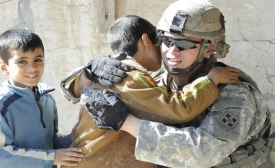public diplomacy
On October 1, 2011, Voice of America’s (VOA) Chinese radio service will go silent, as U.S. international broadcasting abandons the airwaves and moves to the Internet. In the burgeoning age of new media, many...seem to be questioning the continued relevance of shortwave radio.

The USC Center on Public Diplomacy hosted a panel discussion looking at U.S. public diplomacy in the Arab world ten years after the 9/11 attacks.
Read the event synopsis below.
Setting the framework for the event, panelists were asked to consider the question that U.S. policymakers have grappled with, “Why do they hate us?” and then with the broader issues of the tone and substance of American public diplomacy.
What happens in the UN could be a game changer...Therefore expect a fresh wave of hysteria and, along with it, a spate of declarations about how Israel confronts an “existential threat.” That expression entered the political lexicon only recently, thanks mainly to Israeli “public diplomacy.”
The young people who are vulnerable to al-Qaeda's recruitment pitches are likely to be impervious to positive messages about the United States. In addition, linking public diplomacy with counterterrorism risks alienating intended audiences...
Hasbara training is an imperative for the Jewish community. Israel and the Jewish people face enormous challenges today, among them existential physical threats, lies about Israel, and anti-Semitism.
Essentially, the heart of our public diplomacy initiative is to engage more effectively beyond the official level contacts. Sort of going beyond the seminar circuit and establishing a people-to-people contact... The mode involves targeting campus interactions, developing contests, which get young people to think creatively beyond collaborations, beyond summit level engagement. It’s a work in progress.
Almost 10 years after 9/11, the United States has a new window of opportunity to regain the initiative in the “missing battle” of the campaign against terrorism. That is, a sustained soft power effort to win the battle for hearts and minds in predominantly Muslim countries.
There are government agencies such as the police forces in Delhi, Indore and Meerut which use Facebook creatively to track crimes and keep citizens informed . The ministry of external affairs has come in for praise for using Twitter as a tool for public diplomacy. But such examples are few and far between.







